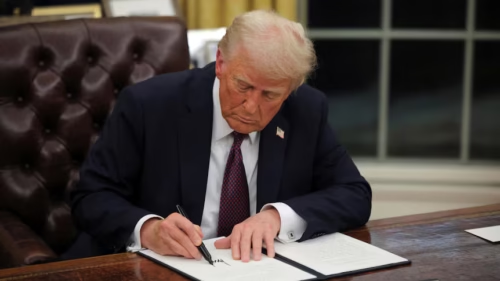
The global economy experienced significant turbulence when former U.S. President Donald Trump introduced sweeping tariffs on imported goods. Within days, the U.S. stock market shed over $6.5 trillion in value, shaking investor confidence and unsettling markets worldwide. While the administration later paused some of the tariffs for 90 days, the most contentious levies particularly those targeting China remained intact.
Many economists viewed these trade policies as short-sighted. Bismarck Rewane, CEO of Financial Derivatives Company (FDC), criticized the tariffs as a “very bad idea,” referencing the principles of David Ricardo, the classical economist known for championing comparative advantage in global trade. According to Ricardo, nations benefit when they exchange goods and services based on their unique resources—be it land, climate, or technological capabilities. Tariffs, on the other hand, distort this balance, leading to higher prices and inefficiencies.
Paul Krugman, a Nobel Prize-winning economist, echoed this sentiment, warning that protectionist policies may seem beneficial but often carry hidden costs. “It makes you think you’re winning, even when the economy is actually losing,” he noted.
Trump’s tariffs aimed to revive American manufacturing and reduce reliance on imports, especially from China. However, critics argue that these measures backfired. Production costs in the U.S. remain high due to labor expenses, and tariffs only added to the burden, prompting businesses to raise prices and cut back on investments. Ultimately, everyday Americans bore the cost through increased prices on consumer goods.
The strategic exemption of some countries from tariffs while maintaining pressure on China suggests that these trade moves were less about fair competition and more about asserting global influence.
Analysts also point to a critical policy flaw: the lack of strategic planning. By imposing tariffs on over 25 countries simultaneously, the U.S. government created a ripple effect of economic strain without fully assessing the consequences, a classic case of what economists call the “cobra effect.” This term refers to unintended consequences of poorly designed policies, drawing from a historical anecdote in colonial India where a bounty on dead cobras led citizens to breed the snakes for profit, worsening the original problem.
This concept holds relevance far beyond U.S. borders. In Nigeria, for example, President Bola Ahmed Tinubu removed fuel subsidies on his first day in office, a move widely supported by economists. However, the absence of safety nets for vulnerable citizens led to immediate economic hardship, with inflation spiking and public frustration growing. The issue wasn’t the reform itself, but the lack of preparation to cushion its impact.
The parallels are striking. Both Trump’s trade policy and Tinubu’s subsidy removal underscore a broader truth: well-intentioned reforms require robust planning, phased implementation, and mechanisms to protect those most at risk.
Trump’s “America First” approach aimed to bring manufacturing back to U.S. soil, but without addressing underlying cost structures or offering long-term solutions, the policy fell short of its promises. Critics argue that protectionist rhetoric must be backed by practical frameworks if it is to succeed.
As global economies watch these developments, some see opportunity. In Nigeria, with its vast population of over 220 million and growing digital infrastructure including systems like BVN, NIN, and a vibrant fintech ecosystem some observers believe the country is well-positioned to attract global trade if it can offer stability and risk management.
Still, the overarching message remains: bold policy decisions, whether in Washington or Abuja, must be accompanied by thoughtful execution. Otherwise, citizens not politicians would bear the consequences.



